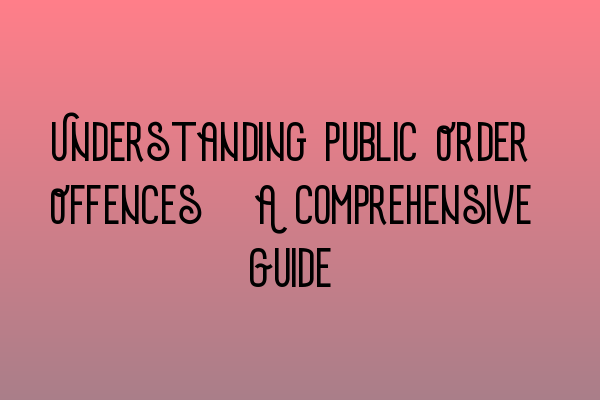Understanding Public Order Offences: A Comprehensive Guide
In the realm of criminal law, there are various types of offences that individuals can find themselves charged with. One category of offences that can often be misunderstood is public order offences. Public order offences encompass a range of behaviours that are deemed to disrupt public order, causing alarm, distress, or fear amongst members of the public.
In this comprehensive guide, we will delve into the intricacies of public order offences, exploring the different types of offences, the potential penalties, and the legal framework that governs them.
Types of Public Order Offences
Public order offences can encompass a wide array of actions, from relatively minor disturbances to more serious acts of violence. Here are some of the most common types of public order offences:
1. Affray: Affray refers to the use or threat of unlawful violence that causes others to fear for their safety. This offence requires that the conduct takes place in a public place and that it is likely to cause a reasonable person to fear for their safety.
2. Riot: A riot involves the participation of three or more persons who, together, use or threaten unlawful violence for a common purpose. Riots often occur in the context of large public gatherings or demonstrations.
3. Violent Disorder: Violent disorder is similar to rioting, but on a smaller scale. It involves three or more people using or threatening unlawful violence, which causes others to fear for their safety. However, violent disorder does not require a common purpose like a riot does.
4. Public Nuisance: Public nuisance covers a range of behaviours that interfere with the comfort or convenience of the public. This can include creating excessive noise, obstructing roads or pathways, or engaging in offensive conduct in a public place.
5. Disorderly Conduct: Disorderly conduct is a broad offence that covers a range of disruptive behaviours in public. This can include fighting, using abusive language, or engaging in rowdy or threatening conduct.
Potential Penalties for Public Order Offences
The penalties for public order offences can vary depending on the specific offence committed, as well as the circumstances surrounding the offence. Generally, public order offences can attract both custodial and non-custodial sentences. Here are some of the potential penalties for public order offences:
1. Fines: For less serious public order offences, individuals may receive fines as a penalty. The amount of the fine will depend on the severity of the offence and the individual’s personal circumstances.
2. Community Orders: Community orders involve individuals completing unpaid work in the community, attending rehabilitation programs, or complying with specific requirements set by the court.
3. Suspended Sentences: In some cases, the court may choose to impose a custodial sentence but suspend it for a certain period of time. During the suspension period, the individual must abide by certain conditions set by the court.
4. Custodial Sentences: More serious public order offences can attract custodial sentences, which involve imprisonment. The length of the sentence will depend on the severity of the offence and any aggravating factors present.
Understanding the Legal Framework
Public order offences in the UK are governed by various pieces of legislation, including the Public Order Act 1986 and the Criminal Justice and Public Order Act 1994. These acts outline the different offences and provide the legal basis for prosecution.
It’s important to note that the prosecution must prove beyond a reasonable doubt that the individual committed the offence. Defences to public order offences can include acting in self-defence, exercising free speech rights, or challenging the evidence presented by the prosecution.
Seeking Legal Advice
If you have been charged with a public order offence, it’s crucial to seek legal advice from a qualified criminal solicitor. An experienced solicitor will be able to assess your case, provide guidance on the best course of action, and represent you in court if necessary.
SQE Criminal Law & Practice Law UK is a reputable solicitor firm with expertise in criminal law matters. Our team of experienced solicitors can provide professional legal representation and advice for individuals facing public order offences. Contact us today to discuss your case and explore your legal options.
For more information on SQE 1 Practice Exam Questions, SQE 1 Practice Mocks FLK1 FLK2, SQE 1 Preparation Courses, SQE 2 Preparation Courses, and SRA SQE Exam Dates, visit the related articles linked below:
– SQE 1 Practice Exam Questions
– SQE 1 Practice Mocks FLK1 FLK2
– SQE 2 Preparation Courses
– SQE 1 Preparation Courses
– SRA SQE Exam Dates
Our team at SQE Criminal Law & Practice Law UK is dedicated to providing comprehensive legal support, ensuring that your rights are protected and that you receive the best possible outcome. Contact us today for expert advice and representation in public order offence cases.
